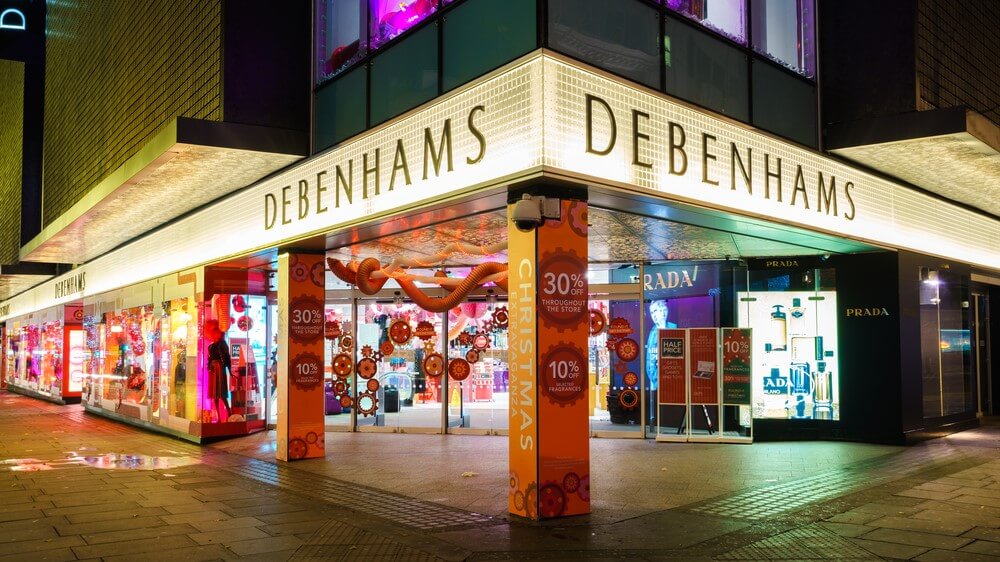Tim Williams, CEO of global customisation company YR, explains the factors that led to the downfall of Debenhams.
The Demise Of A High Street Giant
Tim Williams, CEO of global customisation company YR, explains the factors that led to the downfall of Debenhams.

There has been so much speculation about Debenhams’ performance over the last year, and while the closure of so many of its stores is definitely sad, it has not come as a surprise. Debenhams is a good example of a retailer that failed to recognise and adapt to the rapid changes of its industry.
Ecommerce sales have become an integral aspect of almost every industry, and with fashion retailers constantly improving the consumer experience, both online and in-store, it is evident that Debenhams did not take the tech revolution into consideration soon enough.
Competitive Retail Environment
While there is still the demand for store-based retailing, it is important that this coexists with modern purchasing behaviours.
Experience-led shopping, which fulfils the specific needs of individual consumers is essential, however, it must be recognised that customer requirements and expectations are constantly evolving. A solid store-based shopping experience can harmoniously coexist with a strong digital experience in order to be successful.
The fashion industry is very fast paced, and despite Debenham’s undergoing a rebrand and improving stores, these changes were too little and happened far too late to regain the attention of lost customers.
Stagnation
Having been one of the industry leaders, Debenhams had the benefit of having fantastic retail spaces in prime locations which would naturally draw a constant flow of customers to their stores. In hindsight though, it seems that they failed to grasp what this enabled for their business.
The issue stems from 20 years ago when traditional retail models were just starting to become affected by the introduction of the internet, which effectively shook up traditional sales processes.
Companies were forced to innovate and build a culture of innovation; constant evolution is the only way to keep up with the ever-changing consumer demands – as well as stay ahead of competitors.
It seems that Debenhams was still riding the high of their previous successes meaning they were not adapting at the same rate as their competitors. Only when profits started to dip did they begin to make the necessary changes to turn the company around and address problem areas. Though at this point the company’s issues were beyond resolution.
Loss of Loyalty
The future of fashion is, like in every industry, technology focused and can make supply chains faster whilst creating smaller niche product lines for increasingly diverse consumers.
Giving consumers relevant experiences in store or on their own devices is key to making the sale by promoting creativity and subsequently giving them a reason to be loyal to your business.
Through being more relevant to your customer and always evolving, you gain more loyalty and increased spend. The introduction of technology and e-commerce retail has allowed a new generation of businesses to spawn, carving their own niche and quickly establishing themselves as major competitors to traditional retailers like Debenhams.
By being stuck in its ways and maintaining a constant business model with little change over the years, Debenhams had nothing which helped it to stand out from the crowd, other than the name and even that was losing its allure.
Debenhams has lost almost all relevance and offered nothing unique to new or existing customers, giving people very little reason to choose them over the abundance of other retailers.
We are seeing a similar story with Marks & Spencer, who are facing similar criticisms for failing to capture the engagement of the millennial audience. It is becoming evident that more established brands are having to prove their worth in order to stay relevant to a new generation of shoppers.
While the loss of Debenhams is sad, for those that have been watching its progress over the years, the demise was inevitable. The high-street giant’s downfall ultimately tells a story to other retailers to constantly evaluate their business model to ensure they are up to date and catering to both current and future demands of their customers.
Tim Williams is the CEO of YR.
Thanks for signing up to Minutehack alerts.
Brilliant editorials heading your way soon.
Okay, Thanks!

